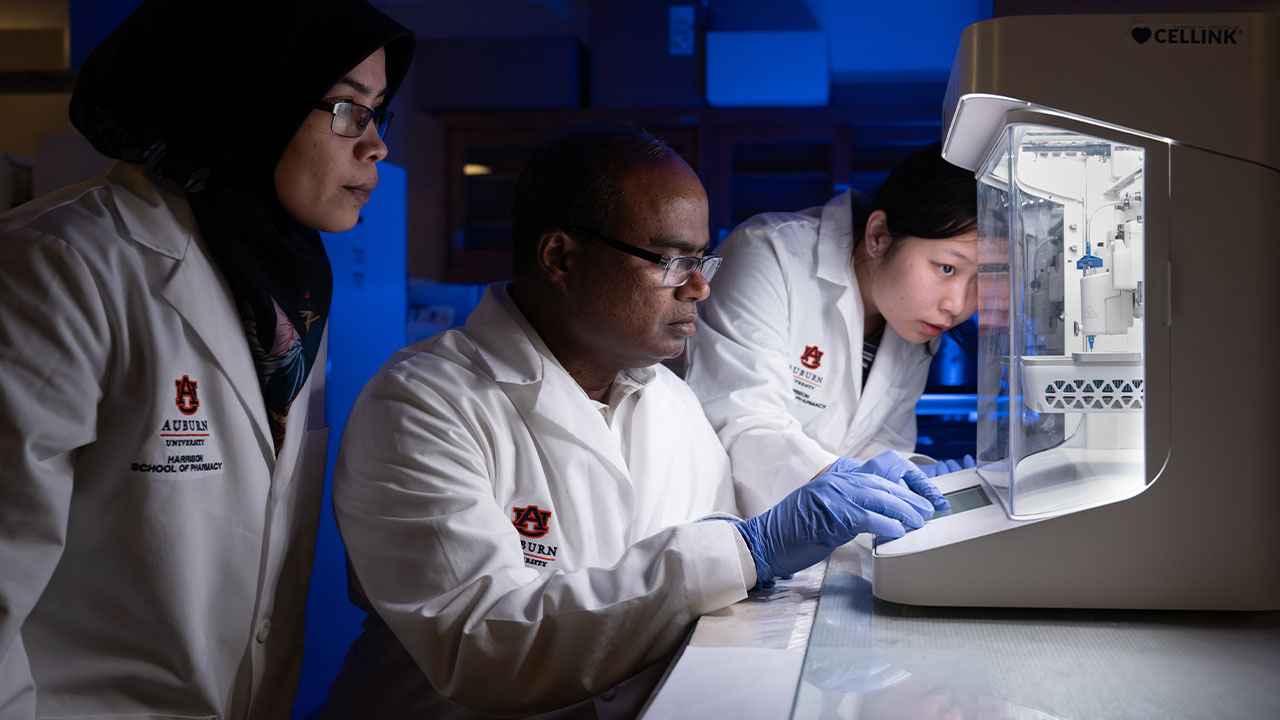content body
Auburn University’s Jayachandra “Jay” Ramapuram has never been one to chase accolades.
With a career spanning more than 25 years, the pharmaceutical scientist and Harrison College of Pharmacy professor has earned many, but his focus has remained on the work: conducting translational research to develop drug products that improve patient outcomes.
Now, for his “distinguished contributions to drug delivery, particularly for his translational work leading drug product launches benefiting the global patient population,” the American Institute for Medical and Biological Engineering (AIMBE) has elected Ramapuram to its prestigious College of Fellows.
The accolade places Ramapuram in an upper echelon, as the College of Fellows represents the top 2% of medical and biological engineers worldwide. Its accomplished members include four Nobel Prize laureates and 30 recipients of the National Medal of Science or National Medal of Technology and Innovation.
Ramapuram is one of 171 scholars who make up the Class of 2025.
While most fellows hail from the United States, AIMBE has inducted individuals representing more than 30 countries. Seventeen fellows are based in Alabama, with two at Auburn.
Elizabeth Lipke, the George E. and Dorothy Stafford Uthlaut Endowed Professor of chemical engineering in the Samuel Ginn College of Engineering, was Auburn’s first inductee last year.
Ramapuram is the second and the first from Pharmacy. He joined the college’s Department of Drug Discovery and Development in 2005.

Jay Ramapuram holds a 3D-printed, orally disintegrating film. The film is easily swallowed and is used as a drug delivery mechanism for pediatric and geriatric patients, or those with swallowing difficulties.
From India to Auburn
Ramapuram’s extensive career began in his native India, where he earned multiple degrees.
He developed a passion for pharmaceutics — the science of designing and developing medications in forms that are safe, effective and easy for patients to use — during his doctoral studies, laying a foundation for his professional journey.
At GlaxoSmithKline in Bangalore, India, Ramapuram worked on the development of tablets, capsules, oral liquids, injectables and topical products. He played a pivotal role in numerous technology transfers and product launches, guiding projects from lab to full-scale manufacturing.
Two years after coming to the U.S. to serve as a postdoctoral research associate at Florida A&M University in Tallahassee, his work in topical formulation and drug delivery methods earned him a Postdoctoral Fellow Award from the American Association of Pharmaceutical Scientists (AAPS).
Ramapuram arrived on the Plains in 2005, determined to bridge academia and industry by fostering partnerships with pharmaceutical companies.
These collaborations have “significantly advanced pharmaceutical development,” he said, including the notable development of a micellar nanoparticle-based cyclosporine eye drop formulation — Nano Tears, which is used to treat dry eye disease.
“This product has undergone multi-center clinical trials and has been successfully commercialized in India,” Ramapuram said. “With demonstrated safety and efficacy, its expansion into markets across Asia and Africa is in progress, offering relief to a growing number of patients with the disease.”
A recent research project involved developing an intravenous drug to improve fertility in large animals. So far, he said his formulation has shown excellent safety in preclinical trials with horses. His lab is also actively developing products to treat eye diseases in large animals, including horses and alpacas.
“I believe my career exemplifies a commitment to translational research, innovation and impactful therapeutic solutions across human and veterinary medicine,” Ramapuram said.
AIMBE obviously agrees, noting that its College of Fellows honors those who have made outstanding contributions to “engineering and medicine research, practice or education” and to “the pioneering of new and developing fields of technology, making major advancements in traditional fields of medical and biological engineering or developing/implementing innovative approaches to bioengineering education.”
What matters
Such a distinction — placing Ramapuram among what he calls a cadre of “highly eminent and accomplished individuals” — isn’t lost on him. More than a title, Ramapuram said the honor is an opportunity for him “to elevate medical and biological engineering scientists across Alabama, ensuring their impact is recognized and supported.”
AIMBE isn’t the only organization to acknowledge Ramapuram lately. AAPS, the same organization that honored him more than 20 years ago, has named him a Fellow. He was one of just eight AAPS members nationwide to be elevated to Fellow status in recognition of his scientific achievements and sustained superior impact in the pharmaceutical sciences.
When the work — “guiding the progression of scientific advancements from research settings to commercially viable drug products with improved patient outcomes” — isn’t driving Ramapuram, it’s the people.
At Auburn, he promises to continue teaching and mentoring students, postdoctoral students and early career faculty, thus “contributing to the growth of the next generation of leaders.”








